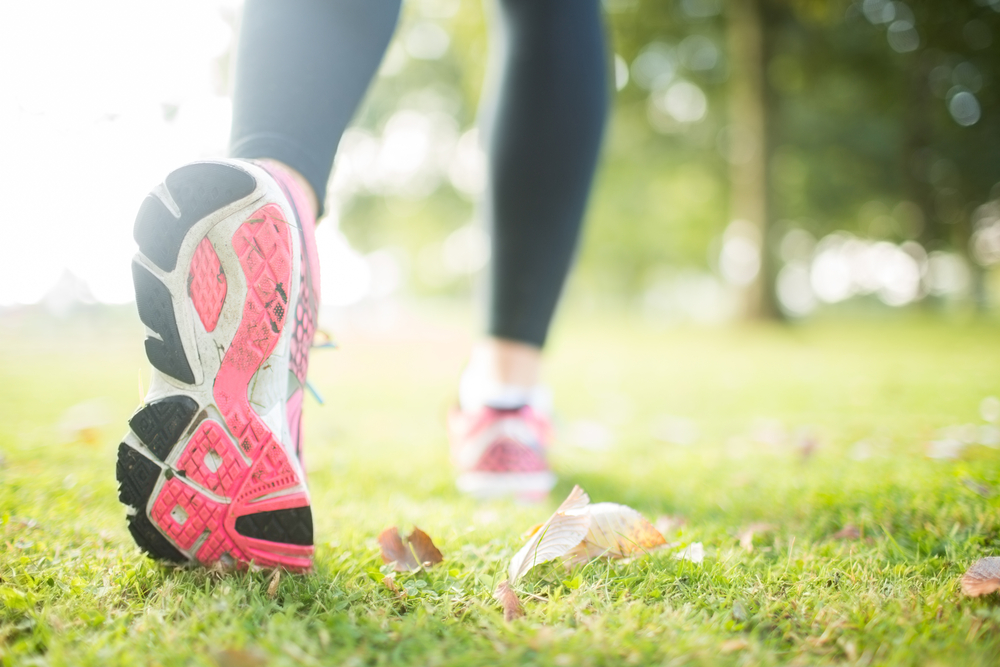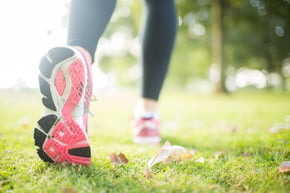
Are Rest Days Important?
A question I get asked frequently: Are rest days important? Here is an unpopular opinion you probably haven’t heard before.
Your rest days, or the days you’re not doing a formal workout, are just as important as days you train.
I know, it’s a crazy concept. And before we get into a few key reasons as to why rest days are important, let’s first clarify what a rest day is.
When you hear the word “rest” what comes to mind? For most, hearing the word “rest” means fantasizing about finally being able to put your feet up, turn the TV on, drown out all the noise of the world, and watch your favorite show. Rest is usually associated with complete relaxation.
That isn’t the case when we are talking about rest days or days off from the gym. A rest day is simply a day where you aren't doing any sort of formal exercise, especially intense formal exercise. Differentiating rest days from complete relaxation days is important, and the first key to rest days will tell us why.
KEY #1: ACTIVITY FACILITATES RECOVERY
I remember when I first started working out. I would obliterate my body in the gym, and on my rest day, I would kick my feet up and be as lazy as possible. I did this because I thought the more movement I had, the less I would recover. This couldn’t have been further from the truth.
In fact, light activity, like walking on a treadmill can actually help your body facilitate recovery and alleviate the sore feeling you may have if you went a little hard in the gym the day before.
KEY #2: ENHANCED RESULTS
What we do in the gym and in our formal workouts is send our body a signal. It may be a signal to increase strength, build muscle, or improve cardiovascular endurance. The workout is where the signal is sent.
But the rest of the time, especially on days off, is where the body adapts and responds to that signal.
If we didn’t give our body’s time to recover by continuously training with intensity, we would actually do more harm to our bodies than good. They may be resilient, but they aren’t made to continuously take a beating. By the way, your workouts should never be about beating yourself up. I was just using that word to illustrate a point. The purpose of your workout should always be to get better, not punish yourself.
KEY #3: DO SOMETHING DIFFERENT
Taking time away from the gym gives you a chance to explore other things that you may not have if you were in the gym. Think about what  you can do with a few extra hours each week. Use that time to explore something new. Do some yoga. Take your kids to the park and play with them. Go to a coffee shop and just enjoy being in the moment. Get some chores done.
you can do with a few extra hours each week. Use that time to explore something new. Do some yoga. Take your kids to the park and play with them. Go to a coffee shop and just enjoy being in the moment. Get some chores done.
Rest days are important because not only will they give you a day off from working out and giving your body a break, it will also free your mind and schedule.
KEY #4: APPRECIATION FOR LOWER INTENSITY
What a rest day should really be called is a “reduced intensity day”, because reducing the intensity is what can allow your body to recover well. Again, a rest day doesn’t have to be a sedentary day.
More isn’t always better. It’s not always better to go harder, lift more weight, push yourself to the limit. There is a lot of good that lies in moderate intensity as well. It’s all about doing the least amount of work to elicit the most amount of change. I am confident that you will be pleasantly surprised when you make your workouts about progressively improving, rather than getting sore, sweating your butt off, or pushing yourself until you want to puke. High intensity is good at times, but not all the time.
One thing you can do is start incorporating mobility sessions on your rest days. The more mobile you become, the better your performance will be in the gym, and you’ll increase the likelihood of greater results. So, next time you find yourself wondering if rest days are important, remember these key takeaways:
KEY TAKEAWAYS
- - Rest days do not have to be sedentary. Get some movement in. Go for a hike, some outdoor walks, walk on a treadmill, do a yoga class with your friends.
- - When you take time off by reducing the intensity of your activity, you’re giving your body to adapt to the signal you send during your formal, more intense workouts.
- - Mix it up. With your time away from the gym, get our of your comfort zone. Do something with your free time. Don’t spend it all on the couch.
ABOUT THE AUTHOR
Adam is a fitness professional, baseball fan, and cookie fanatic based in Fort Worth, Texas. After hanging up the cleats, he found a strong interest in the human body and how it performs. Since then, Adam has been transforming lives through fitness in a fun and encouraging atmosphere. As an ACE CPT and Fitness Nutrition Specialist, he is constantly moved to help people improve in all walks of life.
Subscribe Here!
Topics
- Accessible Fitness Machines (1)
- American Diabetes Association (1)
- American Heart Month (2)
- Awareness (3)
- Benefits of Kale (1)
- Best Fitness Websites (1)
- Breast Cancer (1)
- Breast Cancer Awareness (4)
- Buyer Beware (1)
- Cancer (1)
- Cancer Awareness (4)
- Carbohydrates (1)
- Cardio Aid (2)
- Cardio Equipment (7)
- Celebrity Fitness (1)
- Childhood Obesity (2)
- Christmas List (1)
- Commercial Fitness (12)
- Community (1)
- Corporate Wellness (5)
- Cortisol (1)
- Crossfit (2)
- Crosstrainer (1)
- Deals and Discounts (10)
- Diabetes Awareness (1)
- Diamondback Ellipticals (1)
- Diet (1)
- Diet and Nutrition (31)
- Diet Myths (1)
- Dietary Lifestyle Options (1)
- Eating Clean (1)
- EFX (1)
- Elliptical (14)
- Ellipticals (6)
- ElliptiGo (2)
- Energy (1)
- Exercise (6)
- Exercise Accessories (1)
- Exercise and Diabetes (1)
- Exercise at Work (1)
- Exercise Bike (6)
- Exercise Equipment (26)
- Exercise Equipment Demos (11)
- Exercise Machine (5)
- Exercise Prevents Cancer (1)
- Exercising at Night (1)
- Expresso Bike (2)
- Expresso Stationary Bike (2)
- Fat Loss (7)
- Fitness (23)
- Fitness Accessories (2)
- Fitness and Exercise (99)
- Fitness at Work (1)
- Fitness Blogs (6)
- Fitness Books (1)
- Fitness Education (75)
- Fitness for Special Needs (1)
- Fitness Gifts (1)
- Fitness Journey (5)
- Fitness Machine (11)
- Fitness Machines (4)
- Fitness Motivation (13)
- Fitness on the Go (1)
- Fitness Room (2)
- Fitness Stocking Stuffers (1)
- Fitness Technology (1)
- Fitness Tips (2)
- Fitness Tracker (1)
- Fitness Videos (1)
- Fitness Wearables (1)
- Flexibility (2)
- Food Myths (3)
- Fun and Educational Videos (9)
- Functional Training (3)
- Getting Back in Shape (1)
- GFX (1)
- Gift Ideas (1)
- Gluten Free (1)
- Goals (1)
- Gym Safety (1)
- Health (6)
- Health and Fitness (96)
- Health Myths (1)
- Healthy Eating (2)
- Healthy Food (6)
- Healthy Lifestyle (3)
- Healthy Recipes (4)
- Heart Disease (1)
- Heart Health (11)
- HIIT (7)
- HIIT at Home (7)
- Hip Hop (1)
- Holiday Eating (1)
- Holiday Fitness (1)
- Holiday Meals (1)
- Holiday Parties (1)
- Holidays (1)
- Home Fitness (77)
- Home Fitness Equipment (43)
- Home Fitness Machine (2)
- Home Gym (19)
- Home Gym Design (4)
- Hospitality Fitness (1)
- How to Get More Energy (1)
- Hydration (1)
- IFT (1)
- Injury Prevention (1)
- Insider (1)
- Inspiration (1)
- Inspire Ellipticals (1)
- Kale (1)
- Kids Fitness (2)
- Let's Move! (1)
- Low Cholesterol (1)
- Meal Planning (3)
- Men's Fitness (2)
- Metabolism Booster (1)
- Michelle Obama (1)
- Mobility (3)
- Motivation (1)
- Motivation to workout (4)
- Movember (1)
- New Product News (24)
- New Products (1)
- Nu-Step (1)
- Nustep (1)
- Nutrition (2)
- Nutrition Myths (2)
- Office Exercise (1)
- P3 News (7)
- P3 Retail Store News (12)
- Paleo (1)
- Partnership for a Healthier America (1)
- Personal Training (1)
- Postpartum Exercise Routine (1)
- Precor (17)
- Precor Ellipticals (6)
- Precor Treadmills (4)
- Push Pedal Pull (28)
- Recovery (1)
- Recumbent Bike (4)
- Recumbent Cross Trainers (1)
- Resistance Training (2)
- Resolutions (1)
- Rowing Machine (7)
- senior fitness (1)
- silver sneakers (1)
- Site Blog (33)
- Stay Active During Holidays (1)
- Strength Training (11)
- Stress (1)
- Stress Weight (1)
- Stretching (2)
- Strong is the New Skinny (1)
- Successful Resolutions (1)
- Trade in Elliptical (1)
- Trade in Fitness Equipment (1)
- Trade in Treadmill (1)
- Treadmill (13)
- Treadmills (7)
- True Treadmills (1)
- Used Elliptical (1)
- Used Equipment (3)
- Used Exercise Machines (1)
- Used Fitness Equipment (1)
- Used Treadmill (1)
- Valentine Workout (1)
- Valentine's Day (1)
- Vegan (1)
- Vibration Training (5)
- Warming Up (1)
- Weight loss (17)
- Weight Loss Booster (1)
- Weight Training (3)
- Women's Fitness (4)
- Working Out (5)
- Workout Inspiration (2)
- Workout Partner (2)
- Workouts (5)
